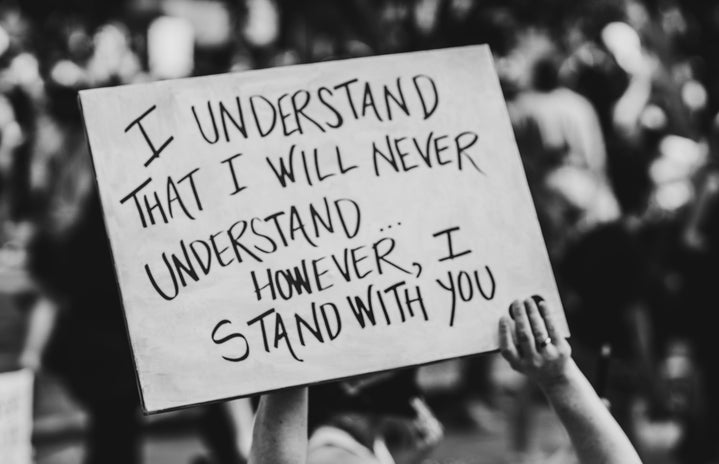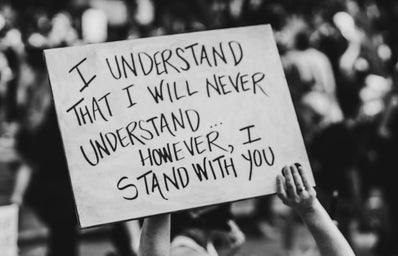TW: racism, violence, hate
Over the past few months, I’ve been writing a lot about the anti-Asian hate crimes that have been happening worldwide. Writing these articles has been my way to express anger and concern but also to provide a platform to educate others. Besides writing, having conversations about these world issues within my social circles is necessary too. These articles are also to encourage and urge readers to start discussions with their friends and family as well.
Recently, a disturbing video of a hate crime against an Asian-American woman circulated on social media. The attack against a 65-year-old woman happened in front of an apartment building in NYC. She was walking on the streets in broad daylight when a man rushed up to her, knocked her down, kicked her stomach and stomped on her face several times; all the while shouting anti-Asian slurs at her. Thankfully, the man was seen on surveillance video and later arrested with hate crime and assault charges. The woman was sent to the hospital for serious injuries but was, thankfully, discharged in stable condition.
However, I’m not here to talk more about the hate crime that occurred in the video. Disgusting, horrifying and unacceptable are a few words I choose to label the video as. Instead, I want to talk about the other individuals caught on camera. There were not one, not two, but three witnesses – all who chose not to intervene. To think that the woman could’ve easily been my mother or grandmother makes me sick to my stomach to know that witnesses stayed as bystanders and didn’t step in to help. Not only did none of the witnesses fail to defend or help the woman up, one of them closed the building door and turned away while the victim was still on the ground.
As much as it makes me sick to watch a video of three witnesses who failed to aid the victim, I don’t want to criticize them more than anyone else already has on social media. I can express my anger and disappointment over and over with every anti-Asian hate crime that happens, but I must also put myself in the situation. What would I do if I witnessed a hate crime? With every video that is shared online, I ask myself the same question. Would I be able to muster up the courage to step in and help? If something ever happened to me, I would want someone to help me. Can others expect the same actions from me? I fear that I will witness a crime one day and stand in shock, not knowing what to do.
I came across a helpful resource by Hollaback! about the five Ds to bystander intervention, and I hope this resource helps you as much as it has helped me.
1. Distraction
Do not engage directly with the perpetrator and instead speak directly to the victim. An interesting point from Hollaback! is that intervening aims to derail the incident by interrupting it. Some helpful examples they provided were to pretend to be lost, pretend to know the victim, spill a drink, bump into the victim or continue what you were doing but get in the way between the harasser and the one targeted. Lastly, don’t talk about or refer to the harassment because that may encourage the perpetrator more.
2. Delegation
Ask for assistance! Go into a nearby store and ask an employee to call 9-1-1 or ask another bystander to intervene and create a distraction. There are usually many people around and they are more likely to help if they know what to do. If you’re also with someone else, ask them to create a distraction while you find a resource or help from a nearby third party. Hollaback! also provided a disclaimer that, if possible, check-in with the victim to make sure they are willing to have law enforcement intervene. Many people and communities have a history of being mistreated and are uncomfortable with being approached by police.
3. Documentation
Nowadays, it’s helpful and sometimes life-changing to pull out your phone and start recording the incident. However, there are some things to keep in mind when documenting harassment. If someone else has already intervened, then evaluate your own safety and start recording. Once the situation deescalates, make sure to ask the victim what they would like to do with the video. Never post anything online or use it without their permission. Being targeted and harassed is a terrible situation to experience and broadcasting the event online is not always what the victim wants. It can also lead to further victimization, a level of unwelcomed exposure and unwanted interaction with law enforcement.
4. Direct
If you’re comfortable with it, then try to confront and respond directly to the harasser. But before you do, evaluate the situation first. Will you be safe? Are you prepared to act if the harasser redirects their hate towards you? Is the person being harassed physically safe too? However, if you choose to intervene, choose your words carefully. Try to phrase your words to name what’s happening during the situation but keep it short and direct. Don’t engage in argument or debate with the harasser and instead return focus on the victim. Use this intervention carefully!
5. Delay
If you’re not in the right situation to assist a victim right when an incident happens, you can still aid them after the fact. Many harassment situations occur in passing or very quickly, so you can still help after. Ask the victim if they’re okay or if they require anything from you. Offer them aid, resources or accompany them to a hospital or police station. If you’ve also documented the incident, ask them what next steps they would like to take. However, remember that being harassed is a disempowering experience and not to bombard the victim with questions right away.
Anti-Asian racism continues to be on the rise and my heart breaks with every newly reported crime. If you ever witness a hate crime, don’t blame yourself for standing in shock and not helping right away. I hope this article will help you learn new ways of helping as a bystander when you witness a hateful situation. For my readers, thank you for reading the entire article and please continue to learn, advocate and share resources with one another. I send my words of encouragement and love to Asian communities while we face this together.



